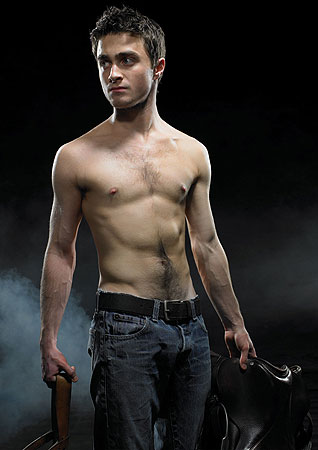In today’s Wall Street Journal column I review two excellent shows, the Broadway revival of Equus and the Shakespeare Theatre of New Jersey’s production of A Streetcar Named Desire. Here’s an excerpt.
* * *
Whatever happened to Peter Shaffer? It’s been nine years since a play by the author of “Amadeus” was last produced on Broadway, and it took Harry Potter to get his name back up in lights. “Equus,” which was the play to see in 1974, returned to New York last night in a big-budget revival that has already wowed the London critics. Would it have made it here without Daniel Radcliffe? No. Does that matter? No. For this is not a tawdry exercise in stunt casting: Mr. Radcliffe gives a self-effacing yet strong performance that serves the play, not his fans.
 Though Mr. Radcliffe has no previous stage experience, he more than holds his own opposite Richard Griffiths, the real star of “Equus,” who is known to “Harry Potter” buffs as Uncle Vernon and to theatergoers as the tortured schoolmaster of “The History Boys.” Here Mr. Griffiths plays Martin Dysart, a child psychiatrist charged with the task of curing Alan Strang (Mr. Radcliffe), a stableboy who blinded six horses for no apparent reason. On the surface the play is an upside-down mystery in which the doctor tries to figure out what made his troubled patient–who turns out to have been sexually attracted to the horses he assaulted–do what he did. At the same time, though, Dysart simultaneously reveals himself to the audience as a middle-aged man suffering from “professional menopause” and trapped in a loveless marriage, and it is his own journey of self-discovery, not Alan’s, that lies at the play’s heart.
Though Mr. Radcliffe has no previous stage experience, he more than holds his own opposite Richard Griffiths, the real star of “Equus,” who is known to “Harry Potter” buffs as Uncle Vernon and to theatergoers as the tortured schoolmaster of “The History Boys.” Here Mr. Griffiths plays Martin Dysart, a child psychiatrist charged with the task of curing Alan Strang (Mr. Radcliffe), a stableboy who blinded six horses for no apparent reason. On the surface the play is an upside-down mystery in which the doctor tries to figure out what made his troubled patient–who turns out to have been sexually attracted to the horses he assaulted–do what he did. At the same time, though, Dysart simultaneously reveals himself to the audience as a middle-aged man suffering from “professional menopause” and trapped in a loveless marriage, and it is his own journey of self-discovery, not Alan’s, that lies at the play’s heart.
Mr. Griffiths’ role was played on Broadway in the ’70s by Anthony Hopkins, Richard Burton and Anthony Perkins. Unlike them, he is a character actor, albeit one of the first rank, and that is how he plays Dysart, as a fat, shambling, unkempt eccentric who is incapable of leading the more emotionally abundant life of his dreams….
I’ve always had trouble with Tennessee Williams’ “A Streetcar Named Desire,” in which poetic fantasy and rough-edged naturalism are uneasily yoked. That is, of course, the point of the play: Blanche DuBois, Williams’ fanciful heroine, is driven mad by her refusal to accept the coarse truth of her own desires. But it is impossible to strike a stable balance between the two aspects of “Streetcar,” and until now I’d never seen a staging that didn’t swerve too far in the direction of overemotional extravagance. Not so the new production being mounted by the Shakespeare Theatre of New Jersey, in which Bonnie J. Monte, the company’s artistic director, keeps it real from start to finish, aided by the breathtakingly fine acting of Laila Robins, the best Blanche I’ve ever seen….
* * *
Read the whole thing here. (You can also see my first Journal video review, a piece on Equus that I taped earlier this week.)
Terry Teachout on the arts in New York City
